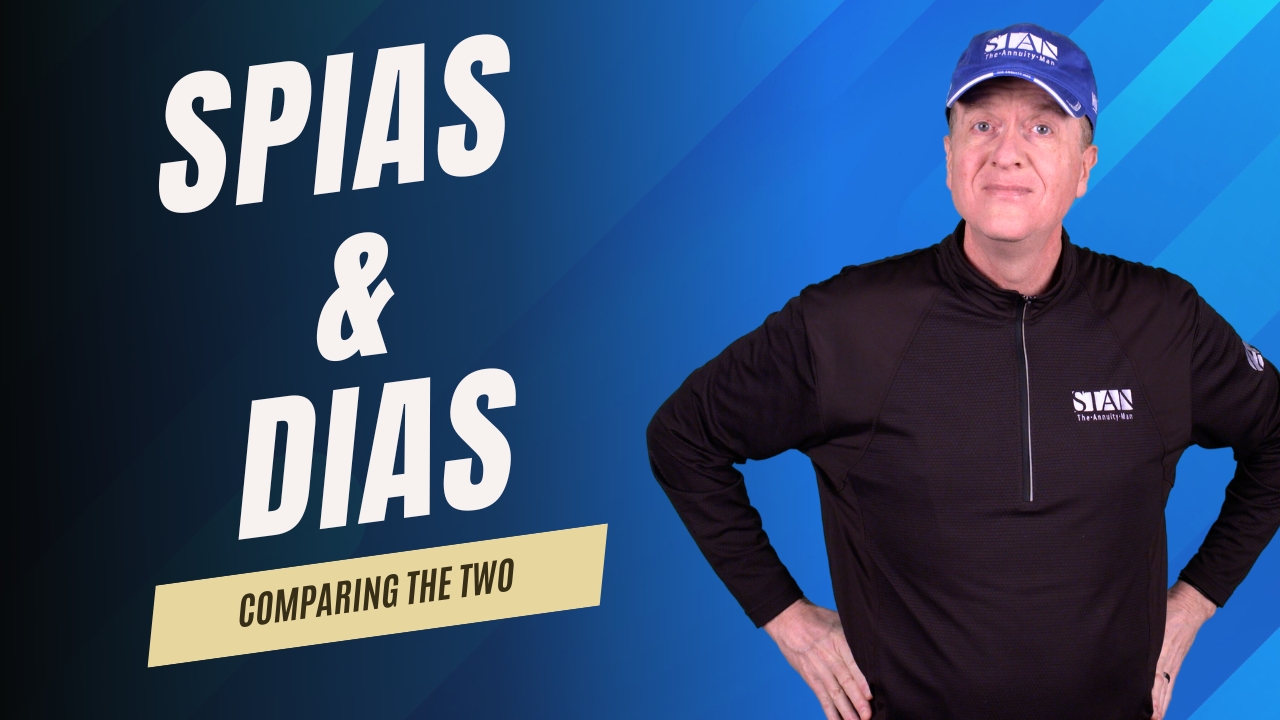Table of Contents
How Much Commission Do Annuity Agents Make?

This could be the best question of all time. Stan The Annuity Man, America's annuity agent. And the burning question that everyone wants to know is how much commissions do annuity agents make? I mean, you guys must be making a killing, right? No. It depends on what annuity you're selling and what annuity type, and we're going to get to all of that. I'm going to go through every single annuity type. I'm actually going to give you the percentage of commissions that are being paid so that you understand if you're buying your agent a car when you buy that annuity from him or if you buy from me. We're very transparent. I am not a philanthropist. Stan The Annuity Man is a for-profit company, but we only want to sell annuities when they're appropriate and suitable for your specific situation. So, hang in there for a very controversial topic, about which I'll get a zillion hate mail emails from the industry because I revealed the ugly little secrets about commissions. But what the heck? Why not? Why wouldn't we? Let's be transparent, starting right now.
Annuity Commissions Are Hidden
Let's take a broad overview of commissions in general. Life insurance companies issue Fixed Annuities. Life insurance and annuity commissions are hidden from the consumer. Am I a fan of that? No. In the past, there was some pending legislation that was going to require all annuity agents to reveal the commissions that would be paid to the agent even though they were paid out of the company reserves. So, when I say it like that, I don't want to get caught in the weeds, and you do not fully understand it. When you buy an annuity, regardless of type, and we're going to go through the types in a second, but when you purchase an annuity, regardless of type, a commission is paid to the agent that sold it to you or the advisor.
Now, you're not going to see what that is. In other words, you put $100,000 in an Immediate Annuity, Deferred Income Annuity, QLAC, or an Indexed Annuity. Regardless of what type you buy; it's hidden from you. You never see it. Do not allow some annuity agent or advisor say, "Well, there are no commissions on an annuity." Give me a break. Come on. We get paid on every single type of annuity that is sold. Now, you can buy what's called a no-load Variable Annuity, but agents aren't involved with that. You can buy a charitable gift annuity, but agents aren't involved with that. When an agent's involved and signs a piece of paper, someone's getting paid, even though you don't see it.
So, if you put $100,000 into an annuity of any type that an agent's involved with, you'll see $100,000 go to work for you. But understand that that agent was compensated from that annuity company reserve.
The Simpler the Annuity, the Lower the Commission
Let's go through specific types of annuities and the range of percentages that annuity agent is getting paid. Now, before we start putting the percentages beside each product, the annuity industry is like herding a bunch of cats. Have you ever herded cats? No. No one's a cat herder. No one has a profession called cat herding because you can't herd cats. The reason I say that I digress is because commissions are different with specific carriers. Some are higher than others; some are lower than others. Understand this though, this is an easy one to remember. The simpler the annuity, the easier it is to understand, and the lower the commission. If you can explain it to a nine-year-old, no offense to nine-year-olds, it will be a lower commission product. The more complex the product, the more it just gets in the weeds, and you don't understand it, the higher the commission. The longer their surrender charges, the higher the commission. Now, you can understand the bad chicken dinner seminar stuff, right?
Commission Percentages
Immediate Annuities, Single Premium Immediate Annuities, depending on the carrier, one to 3%. That's what the commission typically is. I'm giving a range. Please don't hold me to the range, but that's the range. And I represent pretty much all carriers out there.
Depending on the carrier, Deferred Income Annuities would be two to 4%. And by the way, these are commissions that are upfront, one time. There are no ongoing charges or commissions on these. The agent gets paid one time; you never see it. It's built in. It comes out of the company reserves. You see a net transaction.
By the way, side note: this isn't putting down Index Annuities. Index Annuities work. They were designed in 1995 to compete with CD returns, and that's exactly what they do. They're a very efficient delivery system for what's called Income Riders, future income benefits. I'm not down on Index Annuities, but there is a reason that too many agents try to use it as a one-size-fits-all. So, they are a six to 9% commission. Some shorter terms may be a little bit less than six, but most Index Annuities that are being pitched out there that I see, I don't know the industry stats on it, but I'm going to guess have a seven to 10-year surrender charge time period. And what did I say before? The longer the surrender charge time period, the higher the commission, right? So, six to 9%.
Variable Annuities: I don't sell Variable Annuities; just as a side note, I used to when I was in the securities business. Now, I'm not, I'm Stan The Annuity Man, and I only sell contractual guarantees. I only sell Fixed Annuities. I'm going to hedge here because I don't know, but I will guesstimate one to 5%, depending on the type.
There are so many different types of Variable Annuities and so many different structures. There are no load Variable Annuities that don't have any commissions whatsoever. And remember, Variable Annuities were put on the planet in the mid-1950s to create tax-deferred growth. I'm not down on those, either. I'm not down on Variable Annuities. So, all you Variable Annuity guys out there, calm down and stop throwing things at the screen. I just saw contractual guarantees and Variable Annuities. Keyword, variable. If you go up and down, I don't do anything that goes up and down.
Multi-Year Guarantee Annuities, which are CD-type annuities, are going to range anywhere from a half of 1% to, say, 2%. So, a CD-type product is very simplistic. Do you see the pattern? Simple, simple, simple, simple, simple, simple, simple, simple, lower the commission. Complex doesn't mean it's bad, but it's complex with longer surrender charges.
That's why I say a lot of young agents go in that Indexed Annuity space because that's where the commissions are. It doesn't mean it's a bad product. You just need to understand they were designed to create CD-type returns and are a very good, efficient delivery systems for Income Riders. But that doesn't mean it's one size fits all, and everyone needs them.
Soft Money Arrangements
Hopefully that helps. I have one more little piece of nugget information that you need to know about, and I'll tell you in just a second. Some of these annuity companies have what I call soft money arrangements, meaning that in addition to the commissions, there might be an override or a trip or an incentive or something that that agent could get if they sell enough of it, etc.
No way to track it. It's impossible. Just understand that if a person is pitching one annuity to every single person that they meet or they have the bad chicken dinner seminar, and they're only showing one company or maybe two companies, which is insane from a fiduciary standpoint, there's no way that one or two companies can fit everyone sitting in that room eating the bad chicken dinner. To understand, there's kind of an agenda there. There's some soft money. In the securities industry, they got rid of all those incentives and trip-type stuff a long, long time ago. In the Fixed Annuity world with the Indexed Annuities, a lot of that is still going on. I'm not saying it's bad. I'm not saying people are doing the wrong thing. I'm just saying, just keep in mind there are some agendas. If you're not being shown a litany of carriers for your specific contractual guarantee or goal, and someone's just trying to say, "I think this is the best one for you," it probably is the best one for them. Not all the time, but most of the time.
So, annuities are commodity products. You buy them for the highest contractual guarantee. Typically, annuity quotes last like a gallon of milk, every seven to 10 days. That answers the question about commissions and annuity agents. It's a net transaction to you. It's hidden from you, and it's paid from the reserves of the carrier. That's neither good nor bad. That's just a fact.
Okay, so we dug down into that topic. I did another video called "Are annuities a rip-off?". You'd like that one because it dovetails a little bit into what we just talked about. This was pretty specific, but it leads me to a final story.
I had a lady call me last week and say she was being pitched this Indexed Annuity, and again, nothing's wrong with Index Annuities. And the agent told her there was no commission. And so, I told her, of course, there's a commission. I mean, he's got to be getting paid, or else what is he doing as an annuity agent? Unless he's a trust fund baby, just giving it away. He can't do that. If he's selling these annuities and writing his name down on the application, there's a commission involved. And she was pounding the table like, "No, that's not what he told me. He told me there were no commissions." Well, he was kind of playing word games. He was playing semantics, meaning he didn't see the commissions, but there are commissions. So just be aware of that.
But with that being said, do this. Go to my website, and download my books for free. There's one on Fixed Indexed Annuities and Income Riders. There's one on every single type of annuities that you need to learn about. Also, do me one favor and subscribe to my YouTube channel because I'm putting out videos daily, and I want you to get educated and make a good decision on your terms and your timeframe. So, with that, I'll see you on the next blog.
Never forget to live in reality, not the dream, with annuities and contractual guarantees! You can use our calculators, get all six of my books for free, and most importantly book a call with me so we can discuss what works best for your specific situation.
.png)
.svg)













































.jpg)
.jpg)


.jpg)
.jpg)
.jpg)
.jpg)
.jpg)

.jpg)



.jpg)
.jpg)
.jpg)
.jpg)
.jpg)
.jpg)
.jpg)


.jpg)
.jpg)
.jpg)
.jpg)

.jpg)
.jpg)


.jpg)

.jpg)

.jpg)

.jpg)
.jpg)
.jpg)

.jpg)
.jpg)
.jpg)

.jpg)
.jpg)
.jpg)


.jpg)






